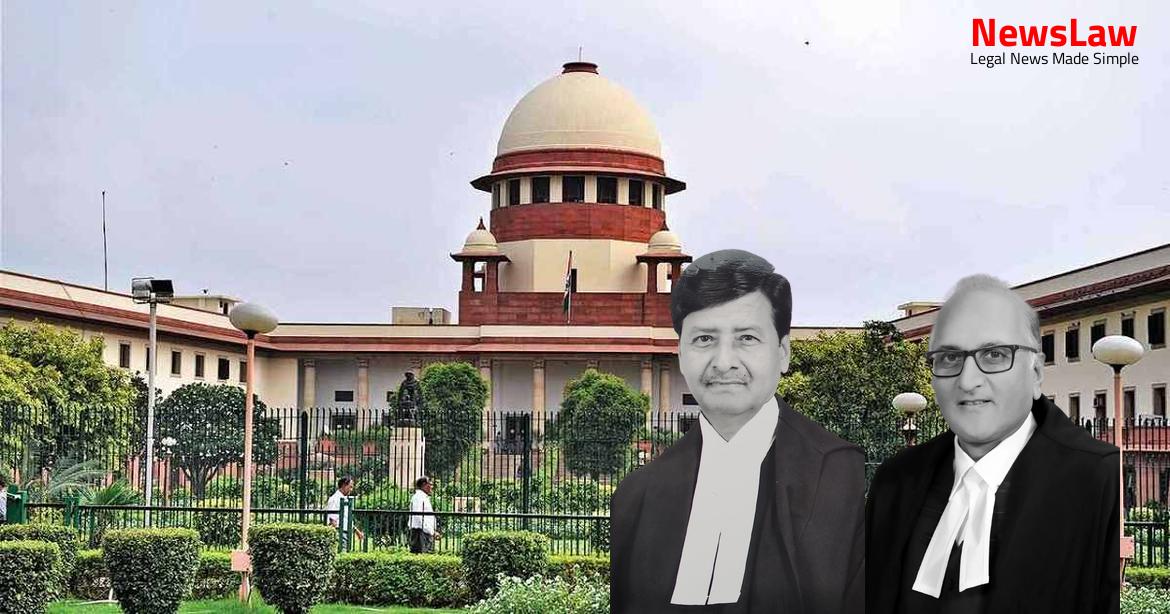Dive into a significant legal case where the court delves into the complexities of contract abandonment. The recent judgment highlights the detailed legal analysis by the court, focusing on key aspects of contract law. Stay tuned to unravel the implications of this judgment in the realm of legal proceedings.
Facts
- Appellant, a registered contractor with the Government of Maharashtra, won a tender for a water supply scheme in Ratnagiri District.
- Respondent No.3 initially kept the work order in abeyance but later asked the appellant to start the work.
- The appellant faced challenges such as changes in terms, non-payment of bills, and unavailability of specified pipes.
- Respondents instructed the appellant to stop pipeline work and start construction at a different location.
- High Court modified the decree amount in the appellant’s favor, but the appellant demanded further modified rates.
- The appellant’s claim included various heads such as work value, security deposit release, compensation, and damages.
- Due to various issues, the appellant did not proceed with the work as per the initial agreement.
- The Trial Court decreed the suit partially, directing the respondents to pay the appellant a sum of Rs. 24,97,077/- with 10% interest per annum from the date of the suit.
- The respondents filed a regular civil appeal under Section 96 of the Code of Civil Procedure, 1908 in the High Court of Judicature at Bombay.
Also Read: Undisclosed Conviction for Dharna Under Police Act Leads to Overturned Election
Issue
- Abandonment of work by the appellant is the main issue in this appeal.
- The judgment will focus on whether there was abandonment of work by the appellant.
Also Read: Critical Analysis of Legal Principles in a High-Profile Criminal Case
Analysis
- The High Court found abandonment of contract based on lack of progress after the second bill was cleared in May 1987.
- The respondents did not allege breach of contract against the appellant nor invoke the right to rescind the contract.
- The respondents could have sought compensation under Section 75 of the Contract Act instead of attributing abandonment to the appellant.
- The High Court mentioned the power to rescind under clause 3(a) of the tender and forfeiture of security deposit.
- Claims for reasonable remuneration can be made on quantum meruit in cases of project abandonment or breach of contract.
- Section 67 of the Indian Contract Act excuses the promisor if the promisee neglects to provide reasonable facilities for performance.
- The refusal to perform obligations cannot be termed abandonment, but rather breach of contract.
- The respondents withdrew the amount deposited before the High Court by the appellant on 13.01.1999 by furnishing a bank guarantee.
- The respondents did not opt to rescind the contract and sue for damages as per the terms of clause 3 (a) and (b).
- The respondents made it difficult for the appellant to execute the contract as originally agreed.
- The High Court erred in overturning the Trial Court judgment on the 3 heads of claims due to a misunderstanding that the appellant abandoned the contract.
- The judgment of the Trial Court is upheld, and the appeal is allowed.
Also Read: Interpretation of Stamp Duty Provisions
Decision
- Appeal allowed, no order as to costs.
- Bank guarantee discharged after appeal allowed.
- High Court judgment set aside, Trial Court judgment restored.
- Respondents deposited Rs.42,98,168/- during first appeal.
- High Court directed appellant to return balance amount, or Trial Court can encash bank guarantee.
- Appellant directed to keep bank guarantee alive during special leave petition.
Case Title: SHRIPATI LAKHU MANE Vs. THE MEMBER SECRETARY MAHARASHTRA WATER SUPPLY AND SEWERAGE BOARD (2022 INSC 368)
Case Number: C.A. No.-000556-000556 / 2012



